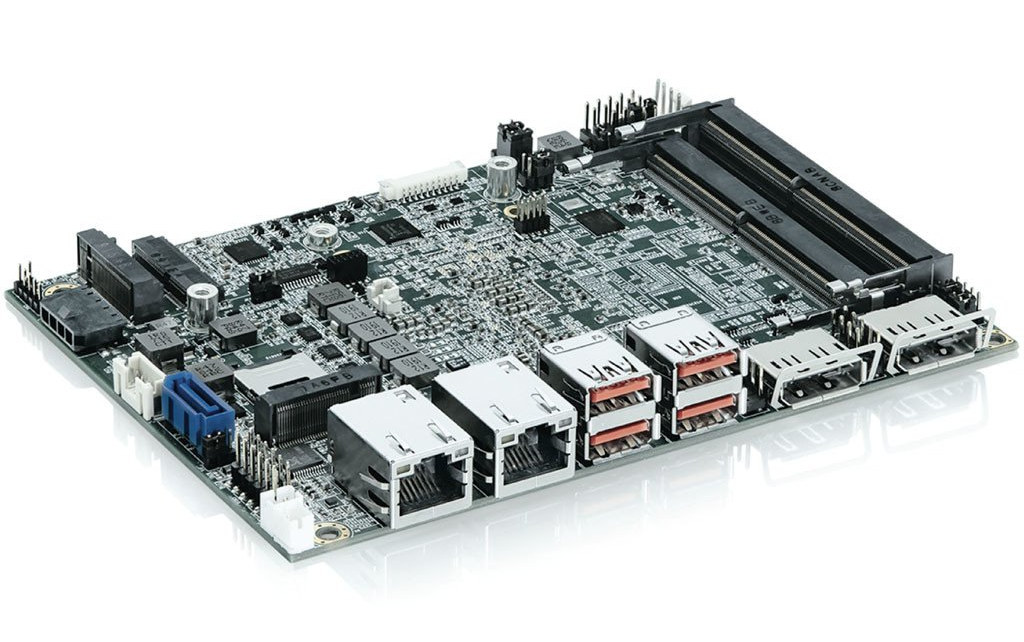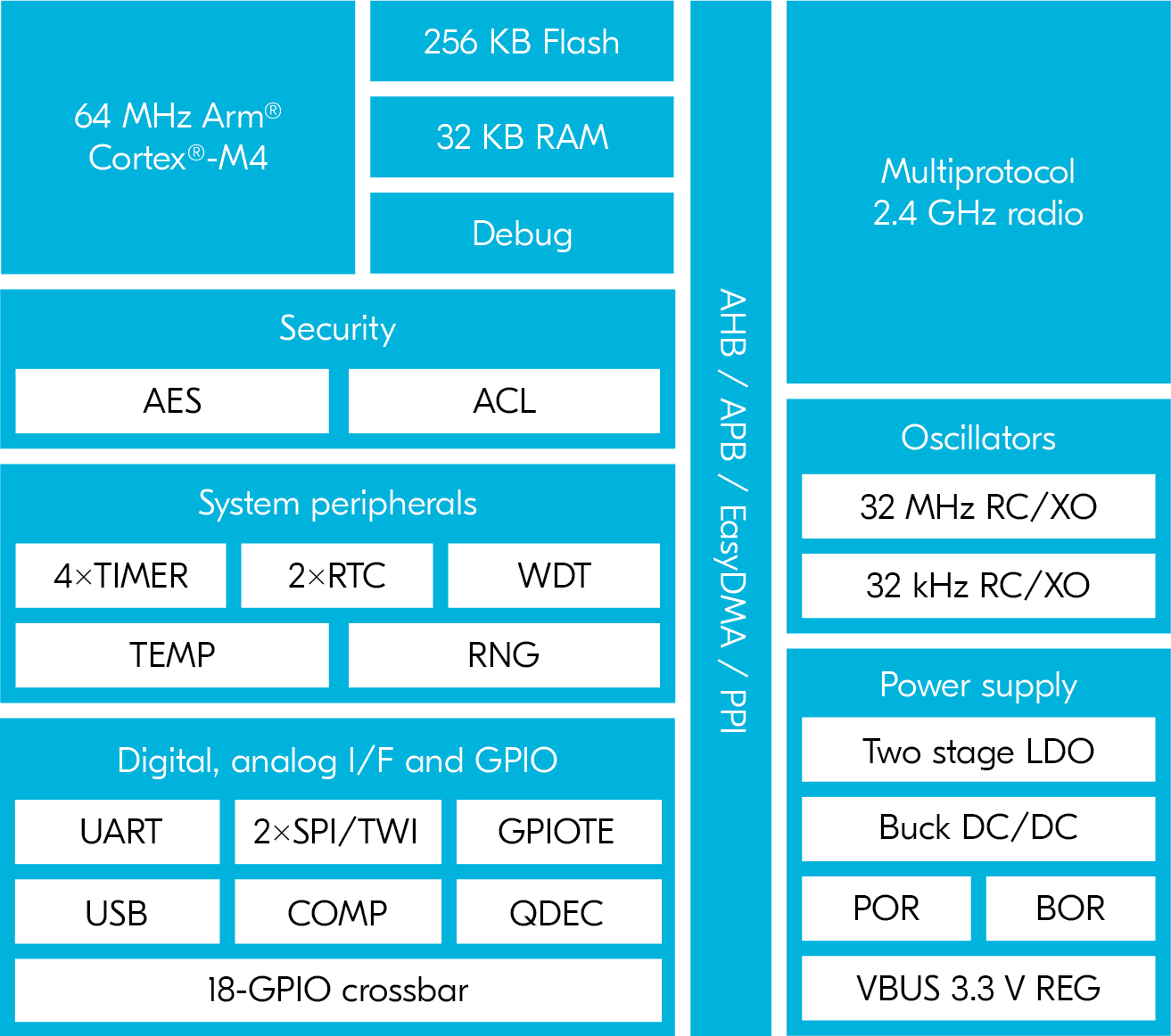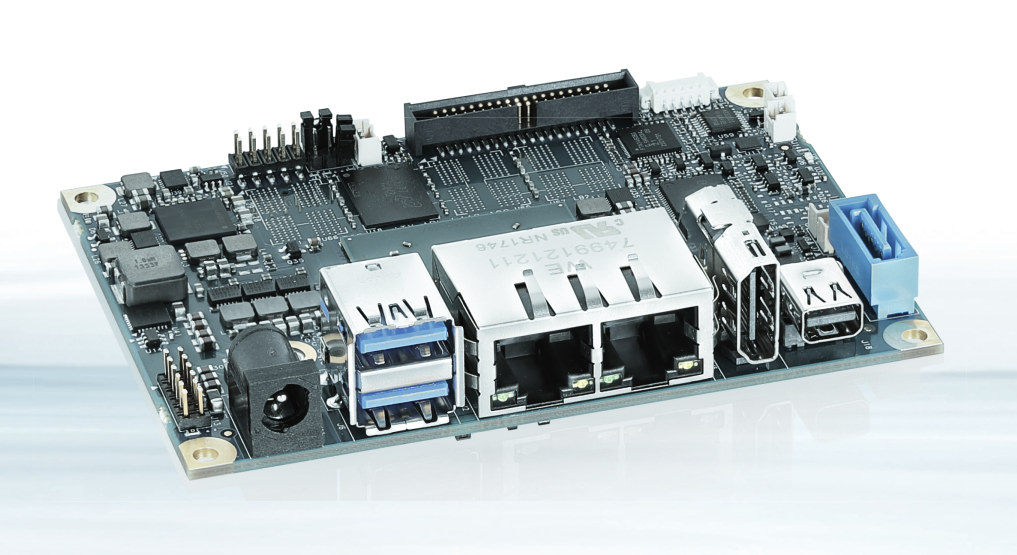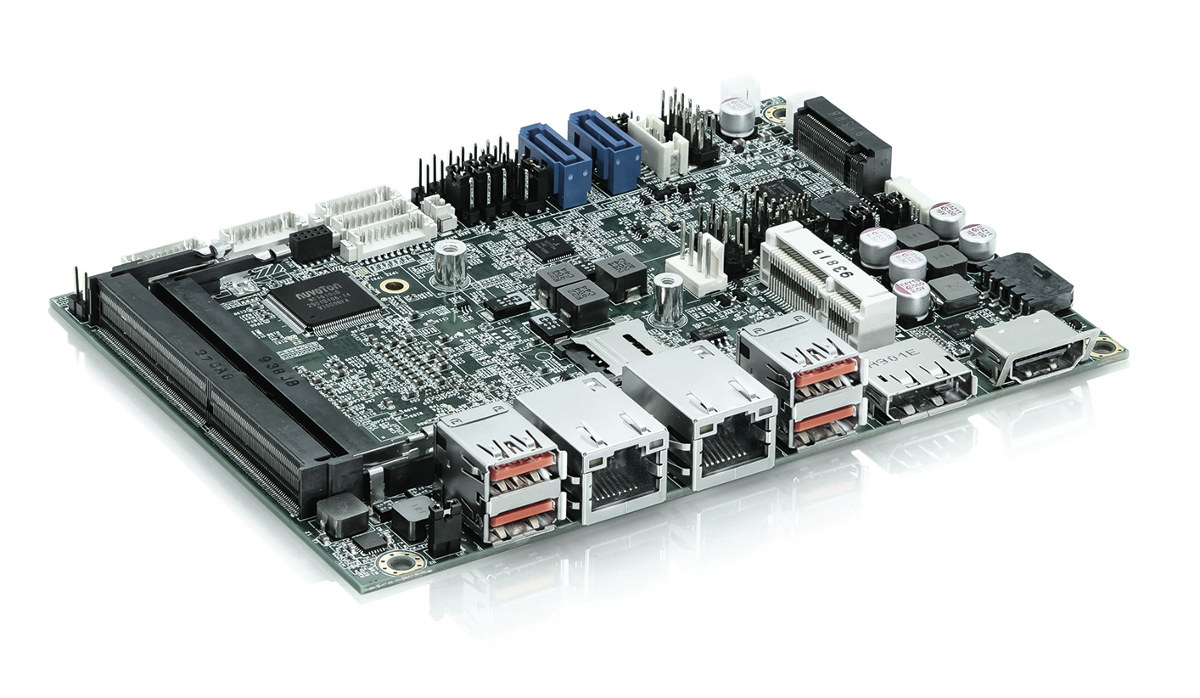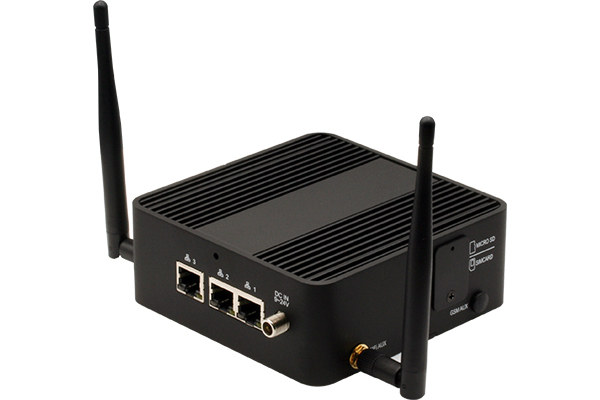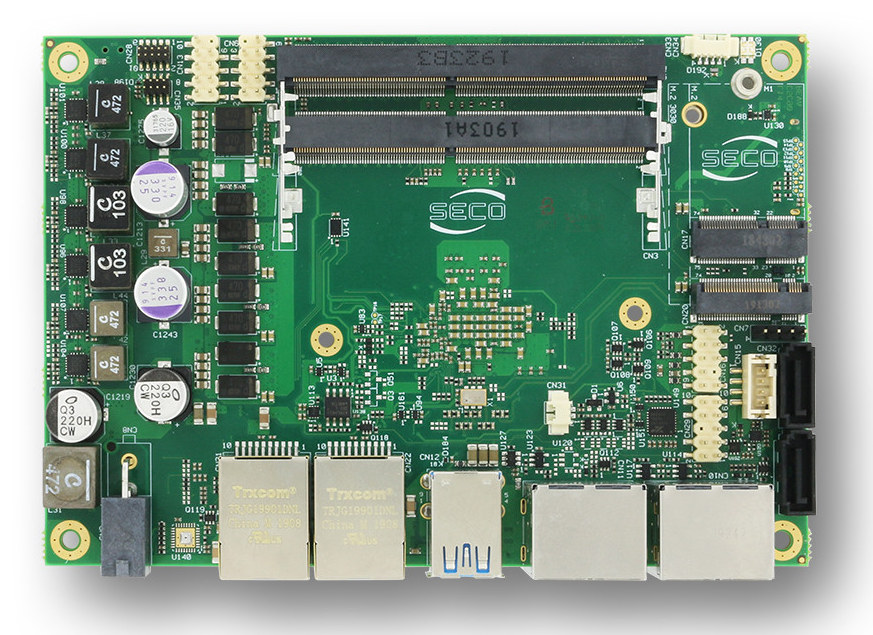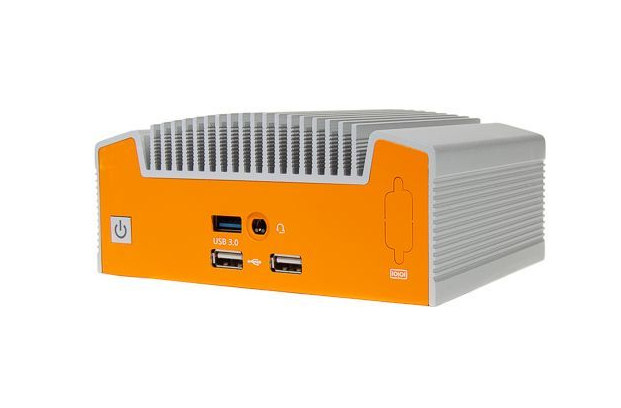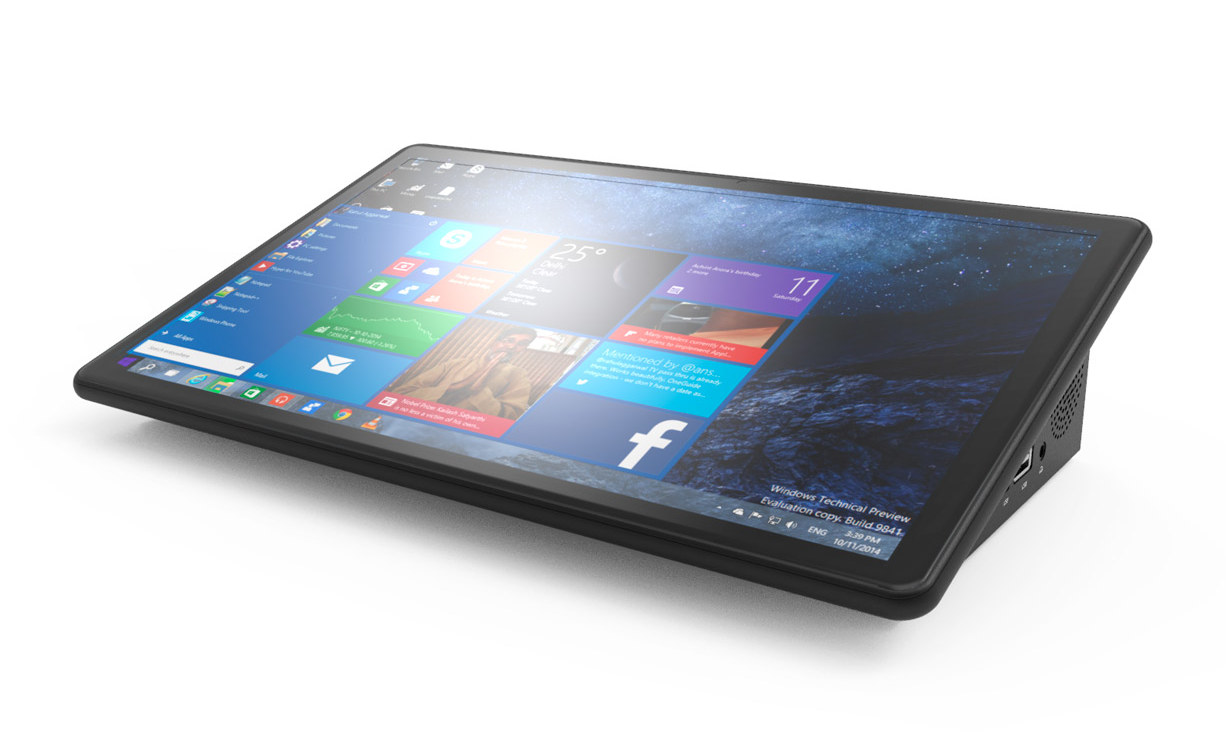We first found out about Intel CNVi (Connectivity Integration Architecture) for WiFi in a block diagram for Gemini Lake processors in 2017. CNVi integrates a WiFi MAC, Bluetooth MAC, and Baseband Modem into the processor, and connect over a CNVio interface to a separate CRF (Companion RF) module handling the RF part. This allows overall cost & power savings and reduction in size. AFAIK, all new Intel desktop and mobile processors come with a CNVi block, but somehow only a few SBC’s are made with M.2 slot compliant with CNVi WiFi cards. But Kontron 3.5″-SBC-WLU single board computer powered by an Intel Whiskey Lake processor is one of those and features an M.2 E-key slot that supports Intel Integrated Connectivity (CNVi) WiFi & Bluetooth modules. Kontron 3.5″-SBC-WLU specifications: SoC (one or the other) Intel Core i7-8665UE quad-core processor @ up to 4.4 GHz with 8MB cache, Intel UHD Graphics 620; […]
Nordic nRF52820 Bluetooth 5.2 SoC Supports Thread, Zigbee and Full Speed USB 2.0
Nordic Semi has launched the sixth multi-protocol SoC part of their nRF52 family with nRF52820 Bluetooth 5.2 ultra low power System-on-Chip (SoC) supporting Bluetooth Low Energy (Bluetooth LE), Bluetooth mesh, as well as Thread, Zigbee, and 2.4-GHz proprietary. nRF52820 can handle all Bluetooth 5/5.1/5.2 versions with features such as Long Range, 2 Mbps throughput, direction finding, LE power control, and LE isochronous channels. The SoC also happens to include a Full Speed (12 Mbps) USB 2.0 interface. nRF52820 key features and specifications: MCU Core – Arm Cortex-M4 @ 64 MHz Memory – 32 KB RAM Storage – 256 KB Flash Wireless Connectivity Bluetooth 2 Mbps, 1 Mbps, Long Range Bluetooth Low Energy Bluetooth Direction Finding Bluetooth mesh Thread, Zigbee 802.15.4/ANT/2.4 GHz proprietary Up to +8 dBm TX power Security – 128-bit AES encryption USB – Full Speed USB 2.0 Other Peripherals UART, 2x SPI/TWI, QDEC Analog comparator 4x 32-bit timer/counter, […]
2.5-inch Pico-ITX SBC Offers LVDS, HDMI & DisplayPort Video Interfaces, Dual Gigabit Ethernet
Today I learned that Pico-ITX boards were also called 2.5-inch boards since they are about the size of a 2.5-inch SATA drive. Kontron pITX-APL V2.0 is one such 2.5-inch Pico-ITX SBC powered by an Intel Atom E39XX or Celeron Apollo Lake processor. The board can drive three independent displays via its 24-bit LVDS interface, HDMI and mini DisplayPort 1.2 output, comes with two Gigabit Ethernet ports and support for 4G LTE connectivity via M.2 slot and SIM card socket. Those features make it suitable for a wide range of applications including industrial client applications, kiosk, infotainment, digital signage, and POS systems. Kontron pITX-APL V2.0 specifications: Apollo Lake SoC variants Intel Atom x7-E3950 quad-core processor @ up to 2.0 GHz with 18EU Intel HD graphics; 12W TDP Intel Atom x5-E3940 quad-core processor @ up to 1.8 GHz with 12EU Intel HD graphics; 9.5W TDP Intel Atom x5-E3930 dual-core processor @ up […]
AMD Ryzen Embedded based SBC-VR1000 SBC to Power Edge Computing & Graphics Applications
We just wrote about a 3.5″ Ryzen Embedded SBC a few days ago, namely SECO SBC-C90 single board computer, after mentioning there were few such AMD options in the 3.5-inch form factor with the only other board we covered so far being IBase IB918. But there’s now at least a third option with Kontron introducing SBC-VR1000 3.5-inch board powered by AMD Ryzen Embedded V1000-series or R1000-series processor, and designed for “intensive edge computing and graphics applications” including digital signage, digital casino gaming, kiosk, retail, banking, education, medical imaging, as well as industrial control and automation. Kontron SBC-VR1000 specifications: SoC (one or the other) AMD Ryzen V1605B quad-core processor @ up to 3.60 GHz with 4M cache, AMD Radeon Vega 8 GPU; 15 W TDP AMD Ryzen V1202B dual-core processor @ up to 3.20 GHz with 4MB cache, AMD Radeon Vega 3 GPU; 15 W TDP AMD Ryzen R1606G dual-core processor […]
FWS-2275 3 LAN Ports Rugged Network Appliance is Designed for Secure Industrial IoT Networks
AAEON FWS-2275 is a rugged network appliance powered by an Intel Celeron N3350 processor and equipped with 3 LAN ports to bring vital functions and security to industrial networks. Specifically, the device is designed for network solutions such as UTM (Unified Threat Management) systems, firewalls, and SD-WAN (Software-defined WAN) appliances. FWS-2275 specifications: SoC – Intel Celeron N3350 dual-core Apollo Lake processor @ 1.10 / 2.40 GHz with Intel HD graphics, built-in Intel AES-NI; 6W TDP System Memory – 2GB LPDDR4 (soldered) Storage – 16GB eMMC flash (32GB optional) Video Output – Optional HDMI connector Networking 3x Gigabit Ethernet ports (1x WAN + 2x LAN) via Intel i211 Optional WiFi or 4G LTE via mini Card (see expansion section) USB – 2x USB 3.2 Gen 1 ports; 1x micro USB port for console Serial – 1x RS-232/422/485 Expansion Full-size mini PCIe slot with SIM Socket 8-pin external header with 4x digital […]
SECO Unveils 3.5″ Ryzen Embedded SBC, Docker-Compatible EDGEHOG OS Linux Distribution
After IBase IB918, here’s another 3.5″ Ryzen Embedded SBC courtesy of SECO SBC-C90 equipped with a choice of Ryzen Embedded V1000 or R1000-series processor, dual Gigabit Ethernet, and four DisplayPort++ ports. Separately from the hardware announcement, SECO has launched a Yocto-based, Docker-compatible Linux distribution called EDGEHOG OS and supporting containers, OTA updates, and remote management. SECO SBC-C90 SBC Specifications: SoC (one or the other) AMD Ryzen Embedded V1000 family: Ryzen Embedded V1807B quad-core/octa-thread @ 3.35GHz (3.8 Boost) with AMD Radeon Vega 11 Graphics; TDP 35-54W Ryzen Embedded V1756B quad-core/octa-thread @ 3.25GHz (3.6 Boost) with AMD Radeon Vega 8 Graphics; TDP 35-54W Ryzen Embedded V1605B quad-core/octa-thread @ 2.0GHz (3.6 Boost) with AMD Radeon Vega 8 Graphics; TDP 12-25W Ryzen Embedded V1202B dual-core/quad-thread @ 2.3GHz (3.2 Boost) with AMD Radeon Vega 3 graphics; TDP 12-25W AMD Ryzen Embedded R1000 family: Ryzen Embedded R1606G dual-core/dual-thread @ 2.6GHz (3.5 Boost) with AMD Radeon Vega […]
OnLogic AMD Ryzen Embedded Mini PCs Launched for $565 and Up
OnLogic Announces Shipping of 2 New Mini-PCs OnLogic has just announced the availability of two AMD Ryzen Embedded powered mini PCs designed for industrial uses. The ML100G-40 is a fanless industrial mini PC, while the MC510-40 is an actively cooled mini PC Overview The ML100-40 has the option of having either a Ryzen Embedded R1505G or a V1605B, and comes with 3 video output ports and dual LAN ports. The system is equipped with 4 GB RAM, 32 GB M.2 SSD by default, and offers a wide range of I/O ports on the rear panel. The MC510-40 is a low-profile fanned industrial Mini-ITX carrying an AMD Ryzen Embedded V1605B processor, with Radeon Vega 8 GPU. The actively cooled Mini-PC has 4 ports for independent displays, M.2 storage, and max 32 GB memory. ML100-40 Specifications and Base Price Ryzen Embedded R1505G $565.00 Ryzen Embedded V1605B $685.00 The ML100-40 can be fitted […]
HiGole F11APL Apollo Lake Industrial Mini PC Comes with a 11.6″ Touchscreen Display
We’ve previously reviewed a few unusual mini PCs and tablets from Shenzhen Qianhai Gole Technology Co., Ltd – better known as just GOLE – such as GOLE F7 rugged tablet very recently, and before that some mini PCs with built-in display as GOLE 10. The company has now come up with an update to the latter with a more powerful Apollo Lake processor. HiGole F11APL comes with a slightly larger 11.6″ touchscreen display, but the Intel Celeron N3450 processor combined with 4GB RAM and 64GB eMMC flash storage will provide much better performance than the previous Cherry Trail-based solution. HiGole F11APL specifications: SoC – Intel Celeron N3450 quad-core Apollo Lake processor @ 1.1 GHz / 2.2 GHz (Burst frequency) and 12 EU Intel HD Graphics 500 @ 200 MHz / 700 MHz (Burst freq.); 6W TDP System Memory – 4GB LPDDR4 Storage – 64 GB eMMC flash, micro SD slot […]


